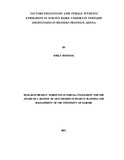| dc.description.abstract | Despite the high munber of career opportunities available in science and technology, the enrolment of female students in science based courses is still low. This study was conducted in tertiary institutions of western province, Kenya and its purpose was to investigate factors influencing the low enrolment among female students in science based courses at the tertiary institutions in Western Province, Kenya.
The objectives covered by this study were: To find out the performance in science subjects at Kenya certificate of secondary education for the female students enrolled in Science-based courses in tertiary institutions in Western province, Kenya; to identify institutional factors influencing female students enrolment in Science-based courses in tertiary institutions in Western Province, Kenya; to find out the social-economic background of the female students enrolled in Science-based courses in tertiary institutions in Western Province, Kenya; to investigate how students factors influence their enrolment in Science-based courses in tertiary institutions in Western province, Kenya.
This study used a descriptive research design. Systematic random sampling technique was employed to select the sample. The study population constituted of 271 female students enrolled in Science courses at thelO tertiary institutions in Western Province and all thelO principals of tertiary institutions within the study area. The sample was comprised of 161 female students enrolled in the Science subjects at the tertiary institutions in Western Province and the 10 principals of these institutions. The instruments of data collection were questionnaire, interview schedule and checklist.
Data was analyzed by using descriptive statistics. The study revealed that curriculum demand was suitable in tertiary colleges, yet students did not seem to have covered the past performances adequately, most of them having dealt with much theoretical aspects of the courses, which affected the competence of the local tertiary level college trained graduates. Secondly, the socio-economic factors such as fathers' levels of income, number of siblings and income of the parents were the main socio-economic factors affecting the enrolment in Science based courses among the female students. The perception of the female towards Science based courses was generally positive and many opted for the course because they had confidence in it.
Finally there were institutional challenges that affected the local tertiary institutions, these were; poor management, lack of basic facilities and a generally poor working environment. From the findings the recommendations were made; that the government of Kenya should establish a clear outline aimed at regulating the learning resources for Science based courses at the tertiary institutions.
The government should also set aside a certain percentage of the funds to each tertiary level college through the Ministry of Higher Education to facilitate the implementation of the practical training programme. Finally, the government should provide resources to eliminate the various problems constraining the effective implementation of the practical programmes in the tertiary institutions by strengthening the overall capacity of these institutions to train students in Science based Course programmes. | en_US |

